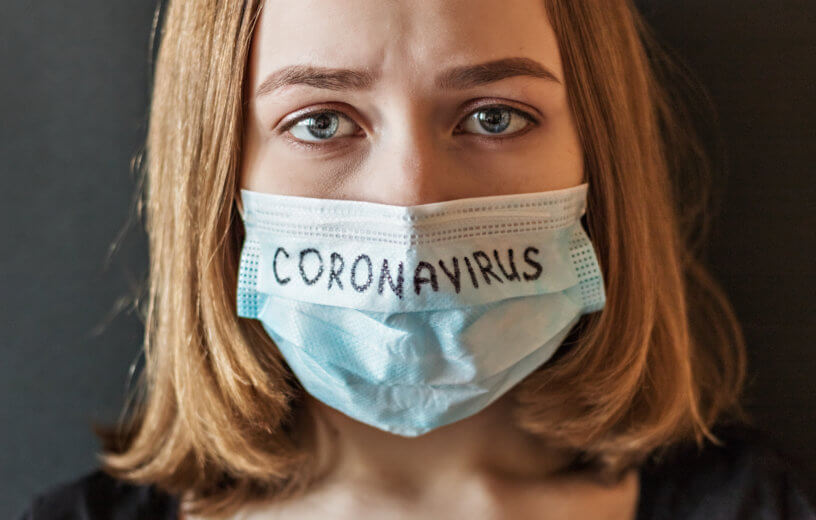From lack of knowledge about symptoms to false, discriminatory beliefs about people of Asian descent, new study reveals that the general public isn’t entirely in the know when it comes to the coronavirus.
STANFORD — We have learned a lot about the novel coronavirus that causes COVID-19 in a short amount of time, but there is still much that we do not understand about this virus. It’s very important that the general public is well informed about the nature of the virus — how it spreads, its symptomology and when to seek care — so we can lessen the burden of this epidemic on our global society. That said, it’s very easy for people to form misconceptions about the virus based on things they read in social media posts. A recent Stanford survey of people in both the United States and the United Kingdom identifies common perceptions and misconceptions of COVID-19 held by the general public.
About 3,000 people from the U.S. and another 3,000 from the UK were recruited to fill out a 22-question online questionnaire about COVID-19. The questions cover things like how to prevent the disease from spreading, who is most at-risk, expectations about the spread of the virus, and even how they expect to act towards people of East Asian ethnicity. Some questions also ask about common “myths” that have been identified by the World Health Organization (WHO).
The results of the survey show that people have a pretty good understanding about how the disease spreads and its major symptoms. That said, many don’t know how to prevent an infection nor the best way to seek care if they think they might have the disease.
For example, most respondents (79.8% U.S., 84.6% UK) know that cough, fever and shortness of breath are the common symptoms of the disease. Some people, however, think that nosebleeds, rash, constipation or frequent urination are other symptoms of coronavirus (25.5% U.S., 18.7% UK), which they are not.
The vast majority of people (74.8% U.S., 81.2% UK) also know the most common way the disease is transmitted: droplets of saliva from an infected person when they sneeze or cough.
When it comes to limiting the spread of the disease, the majority of people (92.6% U.S., 86% UK) correctly identified frequent hand-washing, avoiding close contact with people that are sick, and avoiding touching the face as appropriate methods to prevent catching an infection. However, a good number of people (43.5% U.S., 36% UK) think that the myths from the WHO can also help: using an electric hand dryer, taking antibiotics, rinsing the nose with saltwater regularly or gargling mouthwash.
The survey also shows that a significant number of people (37.8% U.S., 29.7% UK) still believe that wearing a common surgical mask is a very effective way to protect themselves from getting infected with the coronavirus. Hand-washing and social-distancing are much more effective at preventing the spread of the disease than face masks, experts say.
When it comes to seeking care, significantly more Americans than Brits (35.8% U.S., 21% UK) falsely believe that people who get a cough or fever after visiting China or spending time with someone who visited China should show up to the emergency room unannounced, or take public transportation or a ride-sharing service to their primary care provider. This can actually cause more people to get infected than the recommended care-seeking option of staying home and contacting their health care system.
Sadly, an alarming number of respondents admit they’re are going to act differently towards people of East Asian ethnicity. Many people think that Asians are more likely to be infected with the coronavirus, especially if they are seen wearing a face-mask. Over one-quarter from both surveys (25.6% U.S., 29.6% UK) think it’s wise to even refrain from eating Chinese food entirely. And a significant number (29.7% U.S., 40.8%) say that if they were Uber drivers they would reject rides requested by people with Asian-sounding names or appear Asian in their profile picture.
Almost everyone (96.3% U.S., 98.3% UK) knows that older people are at a higher risk of dying from coronavirus once infected. However, many of these same people (53.8% U.S., 39.1% UK) also incorrectly think that children are also at a higher risk of dying after being infected.
Lastly, people are overestimating the fatality rate of the COVID-19 disease. People in the U.S. think the fatality rate is at 5% while people in the UK think it’s closer to 3%. The actual fatality rate is somewhere between 1-2%, thus far.
The authors of this survey highlight the importance of these types of questionnaires. If public health authorities and the media know what the most common misconceptions people have about COVID-19, they can target some of the misinformation people have been getting from social media and other sources. If the general public is armed with proper information they will be relieved of unnecessary anxieties and know the best ways to prevent the spread of the virus, which will ultimately save lives.
The survey was conducted between Feb. 23 and March 2.
For information on symptoms and treatment of coronavirus: United States | United Kingdom
The survey is published in the Annals of Internal Medicine.
